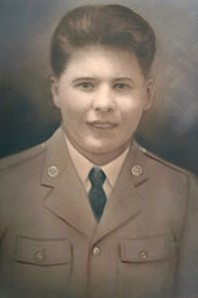Otis Daniely, age 20, from California, Los Angeles county.
Service era: Korea
Date of death: Monday, July 6, 1953
Death details: On July 6, 1953, a large Chinese Communist Forces (CCF) unit attacked and overran the U.S. Army outposts on Pork Chop Hill in an attempt to seize whatever territory possible before the impending armistice agreement. After fighting for the position for four days, on July 10, the 7th Infantry Division Commander determined that the CCF disregard for casualties and desire to hold the outpost outweighed the position’s tactical value, and ordered a withdrawal that was eventually completed on July 11. The U.S. never again controlled Pork Chop Hill, preventing thorough recovery efforts for those who were killed or went missing during the fighting. Private First Class Otis Daniely entered the U.S. Army from California and was a member of Company A of the 1st Battalion, 17th Infantry Regiment, 7th Infantry Division. He went missing in action on July 6 during the fighting on Pork Chop Hill, though the exact circumstances surrounding his loss are unknown. His remains were not recovered, and he is still unaccounted for. Today, Private First Class Daniely is memorialized on the Courts of the Missing at the National Memorial Cemetery of the Pacific.
Source: National Archives, Defense POW/MIA Accounting Agency


 Death details: On July 11, 1950, the U.S. Army’s 21st Infantry Regiment, which had arrived in Korea six days earlier, was placed in defensive positions near the town of Chochiwon, South Korea. The regiment was not at full strength and lacked artillery and anti-tank weapons. That day, they were attacked by North Korean forces and were forced to withdraw to avoid being surrounded, as well as to buy time until they could be reinforced and resupplied. Private First Class Otho Lee Haughn, who joined the U.S. Army from California, served with K Company, 3rd Battalion, 21st Infantry Regiment, 24th Infantry Division. He was captured by enemy forces on July 11, as his unit fought a series of delaying actions between Pyongtaek and Chochiwon. He was forced to march north to the Apex prison camps in North Korea, and died of malnutrition at the camp at Chunggang-jin on November 14. He was buried near the edge of the village; however, his remains were not identified among those returned to U.S. custody after the ceasefire. Today, Private First Class Haughn is memorialized on the Courts of the Missing at the National Memorial Cemetery of the Pacific.
Death details: On July 11, 1950, the U.S. Army’s 21st Infantry Regiment, which had arrived in Korea six days earlier, was placed in defensive positions near the town of Chochiwon, South Korea. The regiment was not at full strength and lacked artillery and anti-tank weapons. That day, they were attacked by North Korean forces and were forced to withdraw to avoid being surrounded, as well as to buy time until they could be reinforced and resupplied. Private First Class Otho Lee Haughn, who joined the U.S. Army from California, served with K Company, 3rd Battalion, 21st Infantry Regiment, 24th Infantry Division. He was captured by enemy forces on July 11, as his unit fought a series of delaying actions between Pyongtaek and Chochiwon. He was forced to march north to the Apex prison camps in North Korea, and died of malnutrition at the camp at Chunggang-jin on November 14. He was buried near the edge of the village; however, his remains were not identified among those returned to U.S. custody after the ceasefire. Today, Private First Class Haughn is memorialized on the Courts of the Missing at the National Memorial Cemetery of the Pacific.